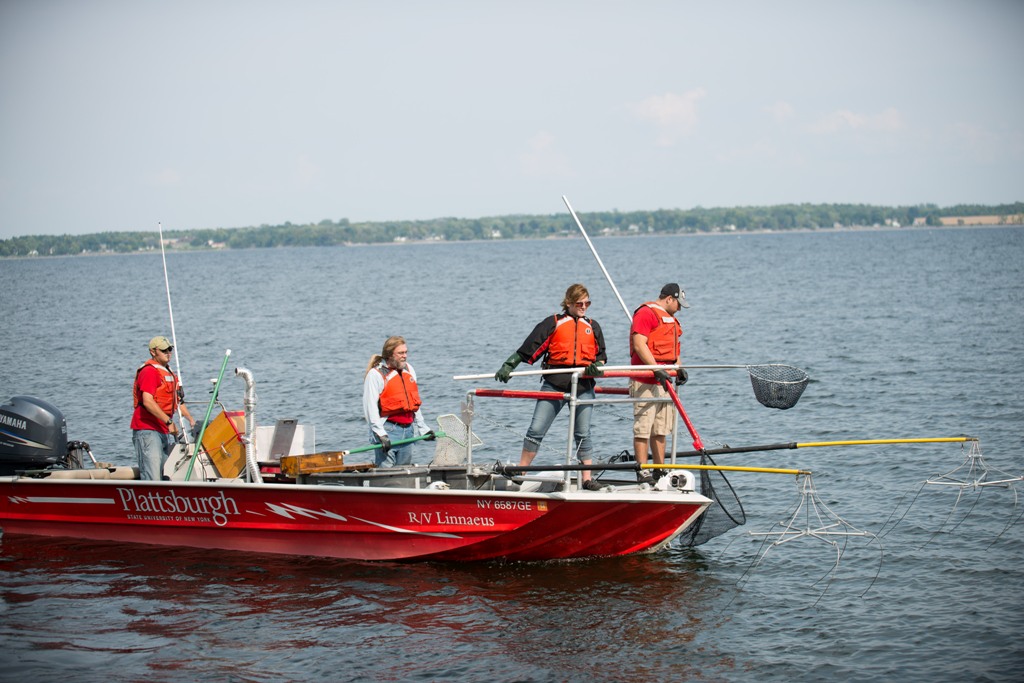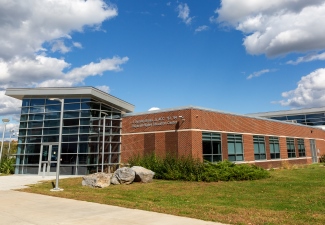Lake Champlain Research Institute Receives Additional Federal Sea Grant Funding

The Lake Champlain Sea Grant Institute has secured additional federal funding, money that will allow SUNY Plattsburgh students and faculty to continue their important research on such environmental issues as climate change, invasive species and microplastics in Lake Champlain.
The funds, from a grant through the National Oceanic and Atmospheric Administration, are shared by the college’s Lake Champlain Research Institute in the Center for Earth and Environmental Science and the University of Vermont.
In 2018, NOAA and the National Sea Grant College Program granted the Lake Champlain program institute status, which came with it a 150-percent increase to its annual budget, from $400,000 to $1 million, used for research, outreach and education meant to improve the environment and economy of the Lake Champlain basin. This additional funding brings the base budget to $1,279,000.
It earned the institute designation for demonstrating excellence in research, education and public service to the environmentally responsible management and development in the nation’s marine, coastal and Great Lakes resources.
 “SUNY Plattsburgh’s Lake Champlain Research Institute has been a partner in Lake Champlain
Sea Grant since the program’s inception in 1991,” said Dr. Timothy Mihuc, distinguished
service professor and LCRI director. “The past 20-plus years have been very productive
for Sea Grand and for SUNY Plattsburgh, with more than $2 million in federal funding
for Plattsburgh to conduct outreach and research projects.”
“SUNY Plattsburgh’s Lake Champlain Research Institute has been a partner in Lake Champlain
Sea Grant since the program’s inception in 1991,” said Dr. Timothy Mihuc, distinguished
service professor and LCRI director. “The past 20-plus years have been very productive
for Sea Grand and for SUNY Plattsburgh, with more than $2 million in federal funding
for Plattsburgh to conduct outreach and research projects.”
This year’s increase comes in the form of merit, designated as such at the national level following an assessment of the program. The Lake Champlain Sea Grant program was awarded added funds based on its meritorious achievement nationally. The LCRI receives $110,000 annually from the Sea Grant budget, according to Mihuc, adding $50,000 annually with institute status. SUNY Plattsburgh’s share of the merit funds are not yet known.
“As a partner institution, SUNY Plattsburgh will benefit from the additional funding to the overall program,” Mihuc said. The additional funding received since 2018 have provided support for New York programs such as the Watershed Education Program. They were used in part to hire Nate Trachte, watershed educator, in 2019.
Over the years, LCRI Sea Grant funding has allowed Plattsburgh faculty and student researchers to study the lake’s thermal profile using remote-data buoys as they search for answers surrounding climate change. Funding has also allowed the LCRI to mount research on invasive species.
“The institute recently discovered two new invasive plankton in Lake Champlain: the spiny waterflea in 2014, and the fishhook waterflea in 2018,” Mihuc said. “Sea Grant outreach on invasive species helps us understand why preventing their transport is so critical to the health of our ecosystems.”
Sea Grant also helped fund research by Dr. Danielle Garneau, associate professor in the CEES, on microplastics in Lake Champlain.
A blue-ribbon review panel convened by the National Sea Grant program in the National Oceanic Atmospheric Administration praised the local chapter for addressing the concerns of communities on both sides of Lake Champlain and supporting research that contributes to the knowledge base in the region.
The Lake Champlain Sea Grant scored in the upper third of the 34 programs nationally, earning it a permanent increase to its base funding.
“Time and again the review team heard strong endorsements of the Lake Champlain Sea Grant Institute from a range of stakeholders who indicated that the Lake Champlain Sea Grant Extension staff are providing them with actionable information and, in the case of educators, instructional resources and professional development that meet the requirements of their school districts,” wrote Jonathan Pennock, director, National Sea Grant College Program.
LCRI provides students a research experience as part of their career preparation. Undergraduate and graduate students conducting research with LCRI affiliates often present their findings at annual events on campus, such as the Sigma Xi student symposium, or at scientific meetings such as the Lake Champlain Research Consortium, Ecological Society of America, the Society for Freshwater Science and others.
News

SUNY Adirondack Students Benefit from New Dual Agreement with SUNY Plattsburgh Queensbury

SUNY Recognizes Two Plattsburgh Seniors for Excellence in Academics, Leadership
